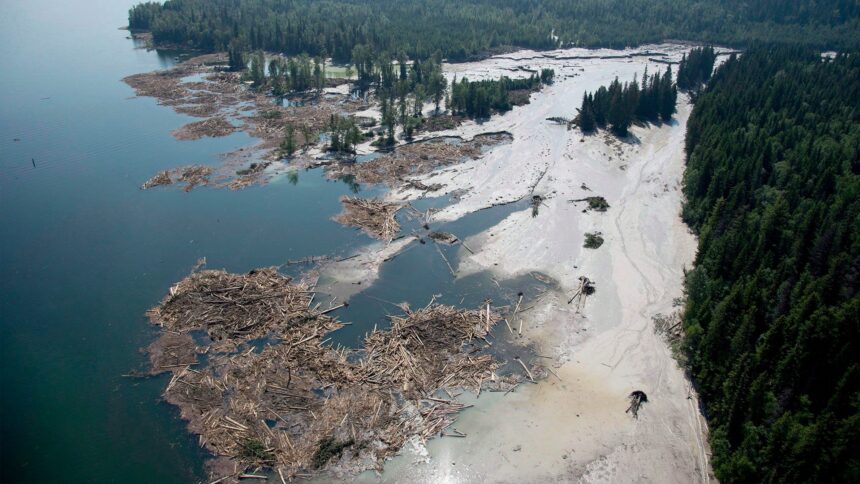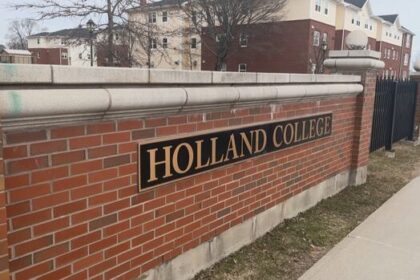The chief of Xatśūll First Nation, along with her legal team and community members were at the B.C. Supreme Court in Vancouver Monday as a judicial review got underway regarding provincial authorizations given to Mount Polley Mining Corporation. The nation is opposing the province’s decision allow the company to raise the height of the same tailings storage facility that devastated Xatśūll Territory when the dam failed in 2014. The Mount Polley mine is located in the Cariboo region of central British Columbia, approximately 56 km northeast of Williams Lake. “We want to ensure an environmental assessment takes place and to make sure that our voices are heard,” Kukpi7 Rhonda Phillips tells APTN News. “It feels like there’s just been a lot of drive-by consultation and we want to ensure that there’s environmental protections and oversight occurring when there’s builds like this happening.” At the hearing, Xatśūll is also “seeking an injunction to prevent Mount Polley from depositing tailings into the expanded portion of the facility until the judicial review is decided by the court,” according to a news release. The nation says the province has a responsibility under the Declaration on the Rights of Indigenous Peoples Act (DRIPA) to consult and cooperate with Xatśūll in good faith to obtain its free, prior and informed consent before going any further with the expansion project. Phillips says Xatśūll will continue withholding consent for the Mount Polley Mine expansion until their concerns are adequately addressed and the lawfully required environmental assessment process is completed. “Especially for a mine that has had a catastrophic breach-one of the biggest environmental disasters in Canada,” Phillips says, noting that consultation has been lacking. “When they come to meet with us, it’s more about checking a box than actually listening to us and implementing our concerns into the decision that they’re making.” On Aug.4, 2014, a failure at Mount Polley’s tailings dam resulted in the release of about 17 million cubic meters of water and 8 million cubic meters of tailings and other materials onto Xatśūll land. The breach had a “significant impact on Polley Lake, Hazeltine Creek and Quesnel Lake, according to the government. In March, the ministers for environment and mining in B.C. issued a consent order to raise the tailings dam of the copper and gold operation by four metres. Their approval came after an Environmental Assessment Office (EAO) review. The ministers agreed with the EAO’s conclusions that increasing the total height to 64 metres from the current 60 metres at the already-developed mine site is not likely to result in new or significant impacts compared to current approved operations. According to the government, the ministers were “satisfied that safety issues have been assessed thoroughly through technical reviews carried out by an external third-party geotechnical engineer and geotechnical engineering experts in the Major Mines Office.” On Aug. 4, 2014, a tailings pond dam breach caused mine waste, water and construction materials to flow into Polley Lake, Hazeltine Creek and Quesnel Lake causing widespread and long-lasting environmental damage and serious impacts. Phillips says it’s this type of disaster they’re worried about with the federal government’s Bill C-5, which got pushed through the House of Commons late last week. The B.C. government also recently passed Bills 14 and 15. Phillips says the pieces of legislation undermine their traditional role as stewards of the land. Bills 14 and 15 in B.C., also known as the Renewable Energy Projects (Streamlined Permitting) Act and the Infrastructure Projects Act are designed to expedite project approvals. Bill C-5 gives the federal cabinet sweeping powers to approve major infrastructure projects behind closed doors. “This legislation really affects our stewardship and our sovereignty. It tells me that our stewardship doesn’t really matter and that’s deeply painful,” Phillips says. “As Secwépemc people we have been stewarding these lands since time immemorial and our survival depends on our ability to look after (our lands and ways of being). Bill C-5 will disregard that entirely,” Phillips says. The outcome of the injunction and judicial review is expected from the Court shortly after the hearing concludes, with the judicial review decision to follow. It’s not clear how long that decision will take. According to B.C.’s Major Mines Office and the Environmental Assessment Office their reviews both included consultation with Williams Lake First Nation and Xatśūll First Nation. A proposed expansion to the mine is still being assessed by the EAO. The government says no decisions have been made on whether or not to approve the expansion to allow the mine to continue operating past 2031. “We’re just going to continue to hold the government accountable to their words,” Phillips says. “When they speak about reconciliation there really should be some substance to it and action behind it.” Read more: Fifteen fisheries charges laid a decade after Mount Polley dam breached in B.C. Continue Reading
Judicial review of increasing level of Mt. Polley tailings dam underway

Leave a Comment










